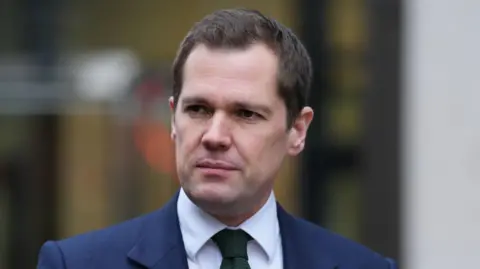Prison release plans endanger public, say Tories
 PA Media
PA MediaThe Conservatives have attacked government plans to ease overcrowding in jails by limiting how long recalled prisoners can be detained.
The plans will see offenders serving one to four year sentences held for a fixed 28-day period if they are returned to prison for breaching their licence.
Ministers argue the move is required to stop jails running out of cells within months, after they inherited a capacity "crisis" from the last Tory government.
But shadow justice secretary Robert Jenrick said it would "put the public in danger and victims in jeopardy".
During a Commons debate on the plans, he argued for "emergency measures" to speed up the deportation of foreign national offenders instead.
The proposals have also been criticised by Tory peer Baroness Newlove of Warrington, the victims' commissioner for England and Wales, who said they would leave victims feeling "unnerved and bewildered".
"I find it difficult to understand why this specific group of offenders has been targeted for early release," she added in a statement on Thursday.
The government estimates that the plans, which will apply in England and Wales, will free up around 1,400 prison places and buy ministers time ahead of a wider review of sentencing due shortly.
The review, led by former Conservative minister David Gauke, is expected to recommend more community-based sentencing to reduce the long-term reliance on imprisonment.
But speaking during the Commons debate, justice minister Sir Nic Dakin said its recommendations would take until spring next year to have an impact, whilst prisons were "perilously close" to filling up now.
'Managed breakdown'
He argued the changes to recall were necessary to avoid a "managed breakdown of the criminal justice system," blaming the previous government for not building enough prisons during its 14 years in power.
The 28-day detention limit would apply to offenders with sentences between one and four years, who have been released after serving their minimum period but then recalled for breaching their licence, such as by not sticking to their curfew.
Those subject to a standard recall would otherwise have to wait for the Parole Board to decide when they can be re-released, a process the government says is taking months amid backlogs in the system.
Ministers say the fixed limit will not apply to the highest-risk violent and sexual offenders, or those who are recalled for committing serious further offences.
It will require new legislation to take effect, which ministers are expected to table in the coming weeks.
The number of recalled prisoners has increased in recent years and they now make up around 15% of the 88,087 prison population, from a useable operational capacity of 89,442.
Last year the Labour government implemented an early release scheme drawn up under the previous government, shortly after taking office.
That scheme, under which qualifying prisoners were let out after serving 40% rather than 50% of their total sentence, saw more than 16,000 offenders released early during the final three months of last year.
The government says that as well as changes to sentencing, a long-term plan to ease overcrowding will also require more prisons to be built.
It has confirmed it wants to start work on three new prisons before the end of this year, and £4.7bn will be allocated for prison-building between 2026 and 2031 at the government spending review, due next month.
